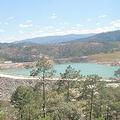在瓜地馬拉,人民對國外掌控的天然資源開發及大型發展計畫有越來越多疑慮,人民領袖拉馬茲尼主教(Alvaro Ramazzini)與一群社區領導人日前對政府提出要求,希望在兩年內暫停發放採礦許可。
拉馬茲尼和許多地方及國際組織領袖認為,目前的礦業法並沒有適當的徵詢當地居民意見,未符合國際勞工組織公約第169號協定(International Labour Organization's Convention 169)中提到的,必須保證原住民對其傳統領域有掌控其發展形式的權力。
根據瓜地馬拉能源和礦業部表示,截至2006年12月止,一共發出365件採礦許可,以及尚有百餘件正在申請中。
國際樂施會(Oxfam International)國際報告指出,瓜地馬拉國土至少有10%的土地已經被移交給跨國公司作為礦產的探勘及開採之用。
 在瓜地馬拉全國,多項大型水壩、礦場、高速公路及水泥廠計畫正在進行中,當局卻往往未與當地佔多數的馬雅人民商量,或是得到他們的支持。拉馬茲尼主教指出,儘管這些計畫承諾提供許多就業機會及農村服務,但其開發模式往往使得社區分裂、破壞環境,並會導致貧窮與不平等更為惡化。
在瓜地馬拉全國,多項大型水壩、礦場、高速公路及水泥廠計畫正在進行中,當局卻往往未與當地佔多數的馬雅人民商量,或是得到他們的支持。拉馬茲尼主教指出,儘管這些計畫承諾提供許多就業機會及農村服務,但其開發模式往往使得社區分裂、破壞環境,並會導致貧窮與不平等更為惡化。
瓜地馬拉當局指出,目前該國正面臨能源危機,繼礦業之後,水力發電站將是最熱門的大型開發計畫。。
根據一個環境組織表示,這些新的水利計畫,背後的動機是想將電力賣給鄰國,這樣一來,受惠的僅是特定利益團體以及國外公司。
Amidst the growing controversy surrounding foreign-controlled resource extraction and mega-development projects in Guatemala, populist leader Bishop Alvaro Ramazzini, together with a group of community leaders, is demanding a two-year moratorium on the granting of mining concessions by the Guatemalan government.
Ramazzini and numerous local and international organizations contend that the current mining law does not properly consult local communities as defined by the International Labour Organization's Convention 169, which guarantees the right of indigenous people to exercise control over the form of development that occurs in their traditional territory.
According to Guatemala's Ministry of Energy and Mines, there were 356 mining licenses granted as of December 2006, with hundreds more in the process.
Oxfam International reports that at least 10 percent of the country's land has been turned over to international corporations for mineral exploration and exploitation.
Across the country, large hydroelectric dams, mines, super-highways, and cement plants are being planned, often with limited consultation with, or support from, the indigenous Maya majority.
Despite the promise of much needed job opportunities and rural services, this model of development often leaves communities socially divided and environmentally damaged, and, according to Ramazzini, leads to an increase in poverty and inequality.
After mining, hydroelectric dams are the target of the hottest mega-development debate in Guatemala. As stated by the current administration, there is an energy crisis in Guatemala According to a environmental organization, the motive behind these new hydro-projects is for the sale of electricity to surrounding countries, which they say will benefit only particular economic interests and foreign companies.







